Themes > Features
14.12.1999
Seattle and the Smaller Countries
Media coverage of the
breakdown in world trade talks at Seattle has tended to concentrate on the
protests by NGOs and their role in forcing the meeting to close without
conclusion. But there was another, possibly even more significant,
development at Seattle : the open protests by representatives of many
small developing countries, at the undemocratic manner in which the
meetings were being conducted, and the complete neglect of their own
interests.
The protests were remarkable for two reasons : first, the fairly strong language used to express dissent, which is unusual in such intergovernmental negotiations; and second, the sheer length of time they took in coming at all. The strong reaction came about because in Seattle, even the usual niceties of multilateral negotiations were not observed, and the smaller developing countries were openly treated with contempt or simply ignored by the "main" negotiators.
Thus, most of the important negotiations took place in "green room" meetings where only a few countries were invited. Most developing country members of the WTO were not able to participate; only some like, say, India, Brazil and Malaysia would typically be included. But even if a country was invited to a meeting on a particular issue, it may not have been a participant in meetings related to other issues. Many developing countries - and especially the smaller countries - were not invited to any meeting on any issue at all.
While this is contrary to both the spirit and the letter of the WTO, which is supposed to run along the lines of the UN system with equal participation of each member, it does faithfully reflect the unequal power structure and modes of operation of the WTO so far. For nearly five years, and even before as the Uruguay Round negotiations were in progress, the large bulk of developing countries in the world were passive recipients of this process, and tended to go along with it simply to avoid being left out of the process entirely.
But this time, evidently, the overt inequality and display of power during the negotiations by the more powerful was too much to tolerate. This is why, on the penultimate day of the Seattle talks, there were two separate statements from WTO members from the Latin American and Caribbean region, and African members. These protested against the host country tactics and utter lack of transparency in the processes at the Ministerial meeting and - more importantly - threatened to withhold consensus from any final outcome.
The GRULAC (Spanish acronym for Latin American and Caribbean group of countries) Ministers' declaration expressed :
1. "to the host country, our profound surprise and resulting anger at the organisation and lack of concern for providing the high dignitaries and delegates attending this Ministerial Conference with minimum conditions of security, and for allowing in some cases, physical and verbal aggressions against its distinguished guests."
2. "To the authorities of the Conference and the WTO Director-General's office, our express disagreement with the way in which the negotiations are being conducted at the Ministerial Conference, a way that shows a parallel course of action between a discourse oriented to transparency and the participation by the delegations, and a process of limited and reserved participation by some members which intends to define the scope and extent of the future negotiating round that all member-countries are to adopt. We are particularly concerned over the stated intentions to produce a ministerial text at any cost, including the modification of procedures designed to secure participation and consensus.
3. "To all WTO members, their strong conviction that, as long as conditions of transparency, openness and participation that allow for adequately balanced results in respect of the interests of all members do not exist, we will not join the consensus required to meet the objectives of this Ministerial Conference."
In a separate statement, the Trade Ministers of the Member states of the Organisation of African Unity/African Economic Community (OAU/AEC) said very similar things, including :
"We wish to express out disappointment and disagreement with the way in which negotiations are being conducted at this Third WTO Ministerial Conference. There is no transparency in the proceedings and African countries are being marginalised and generally excluded on issues of vital importance for our peoples and their future. We are particularly concerned over the stated intentions to produce a ministerial text at any cost including at the cost of procedures designed to secure participation and consensus. We reject the approach that is being employed and we must point out that under the present circumstances, we will not be able to join the consensus required to meet the objectives of the Ministerial Conference."
These sharp statements were important, because they indicated that the possibility of any kind of "success" in the negotiations was unlikely even leaving aside the street protests by NGOs and other groups that garnered most of the publicity. Of course the post-mortem on the Seattle talks will continue for some time, as different reasons for the failure are put forward by different groups. Some NGOs have seen this as a famous victory, and certainly the public protests were what dominated the headlines and television screens.
But this would not have been enough to scuttle negotiations which have been planned for more than a year, if at least one of the major players - the US - had not played along. The US administration behaved like one determined to kill these particular talks, whether in the cavalier and arrogant manner in which it handled the negotiations, or in the way in which Clinton used the street protests to push an agenda - linking trade sanctions with labour and environmental standards - which had already been rejected very clearly by most WTO members. In the process, the US also succeeded in sidelining the demands which had been made by most developing countries for stocktaking and review of the Uruguay Round Agreements and of the mode of functioning of the WTO.
But ascribing the failure of the talks to the US stance alone would be too simplistic. In any case, the street protests themselves were far more wide ranging than was projected by the US administration and the western media - they encompassed not just Northern labour and environment issues but also deep concerns of developing country citizens on the negative effects of the functioning of the GATT agreements and the WTO so far. These ranged from the adverse effects of more open economies on employment, work security and labour conditions, to greater exposure and vulnerability to international capital flows and less bargaining power vis-a-vis large multinational companies, to reduced possibilities for autonomous industrialisation and theft and monopoly of knowledge through the TRIPS agreement.
In fact, the really significant fact about Seattle may be that, after a very long time, many developing countries actually came together to voice their concern at these processes and displeasure at the manner in which decisions were being forced upon them. The absence of even a semblance of unity among developing countries has been an important reason why they have so far been unable to push through even a minimal common agenda at the WTO. A more active and united approach at least on some basic areas of concern would go a long way towards a more democratic and less unfair agreement.
Thus it could be argued, as Martin Khor of Third World Network has suggested, that "the more basic cause of the Seattle debacle was the untransparent and undemocratic nature of the WTO system, the blatant manipulation of that system by the major powers, and the refusal of many developing countries to continue to be on the receiving end."
The seeds of what could therefore be seen as a kind of North-South battle were sown in Geneva in the weeks before Seattle. A large number of developing countries voiced their disillusionment that five years after the WTO's creation they had not seen any benefits. Further, the poorer and smaller countries face potentially enormous dislocation when they attempt to implement their obligations arising from the WTO's many agreements.
In Geneva, such developing countries, including many of the Least developed Countries, had put forward dozens of proposals to resolve the "problems of implementation" of the WTO agreements, including changing some of the rules. But most of their demands were summarily dismissed by the major powers like US and EU. Instead, the latter pushed for their own proposals to further empower the WTO through introducing new areas such as investment, competition, government procurement, labour and environmental standards.
The developing countries in general had been opposing these new issues which they saw as either opening up their markets further to the rich nations' big companies, or giving the rich nations new protectionist tools to block imports from incipient industrialisers or semi-industrialised countries. The road to Seattle was marked with some trepidation on their part that these issues would be pushed through nonetheless, and indeed that danger still remains once the work starts again in Geneva in January. But the degree of disgust with the process which prompted the protest statements may still work to give impetus to a common stand by many small developing countries.
The Least Developed Countries and world trade
In a way, the real surprise is that more vociferous protests from smaller countries have not come sooner. The Uruguay Round negotiations resulted in an agreement that had little or nothing to offer smaller developing countries, and especially the Least Developed Countries. This was even officially acknowledged, in the form of a special clause promising "special and differential treatment" to Least Developed Countries and giving them some concessions in the matter of opening up their own economies.
However, the practice turns out to have been even worse than the written agreement. The LDCs in particular are caught in a cleft stick : if they stay out of GATT and WTO membership, they would be forced into costly and unbalanced bilateral negotiations which they cannot afford and in which they would be severely disadvantaged. But inside the WTO, they find that none of their legitimate concerns are met; that the process of implementation of the various agreements is time-consuming, costly and leads to massive domestic dislocation, that they may have to go in for expensive legal advice simply to counteract allegations in disputes; and that in general the system makes no real allowance for the very different contexts of small countries without the financial and human resources to devote to the Geneva organisation.
In addition, some of the most well-publicised promises of the Uruguay Round have failed to materialise; indeed, the reality has been completely opposite. Even as the growth in value of world trade has decelerated and even turned negative since 1995, the situation of smaller and less developed countries has worsened within the overall deceleration. The inequalities of the international trading system appear to have been strengthened, rather than diminished.
There were supposed to be very large increases in the volumes and prices of developing country exports. The WTO came into existence on 1 January 1995. In the four years that followed, the average rate of export growth of developing countries was actually lower than in the previous four-year period. The prices of the principal exports of developing countries, which were buoyant between 1993 and 1995, have since fallen very sharply. While this is true of many important manufacturing exports of developing countries, it is especially so for primary commodities, except for some food and beverages which are dominantly exported by developed countries.
Chart 1, which shows the annual rate of change of prices of non-oil primary commodities, indicates that after 1995 the dominant tendency has been that of decline. While this is bad news for all primary commodity exporters, it is particularly bad for those who are dominantly dependent upon not just primary exports in general, but on exports of a single commodity.
The protests were remarkable for two reasons : first, the fairly strong language used to express dissent, which is unusual in such intergovernmental negotiations; and second, the sheer length of time they took in coming at all. The strong reaction came about because in Seattle, even the usual niceties of multilateral negotiations were not observed, and the smaller developing countries were openly treated with contempt or simply ignored by the "main" negotiators.
Thus, most of the important negotiations took place in "green room" meetings where only a few countries were invited. Most developing country members of the WTO were not able to participate; only some like, say, India, Brazil and Malaysia would typically be included. But even if a country was invited to a meeting on a particular issue, it may not have been a participant in meetings related to other issues. Many developing countries - and especially the smaller countries - were not invited to any meeting on any issue at all.
While this is contrary to both the spirit and the letter of the WTO, which is supposed to run along the lines of the UN system with equal participation of each member, it does faithfully reflect the unequal power structure and modes of operation of the WTO so far. For nearly five years, and even before as the Uruguay Round negotiations were in progress, the large bulk of developing countries in the world were passive recipients of this process, and tended to go along with it simply to avoid being left out of the process entirely.
But this time, evidently, the overt inequality and display of power during the negotiations by the more powerful was too much to tolerate. This is why, on the penultimate day of the Seattle talks, there were two separate statements from WTO members from the Latin American and Caribbean region, and African members. These protested against the host country tactics and utter lack of transparency in the processes at the Ministerial meeting and - more importantly - threatened to withhold consensus from any final outcome.
The GRULAC (Spanish acronym for Latin American and Caribbean group of countries) Ministers' declaration expressed :
1. "to the host country, our profound surprise and resulting anger at the organisation and lack of concern for providing the high dignitaries and delegates attending this Ministerial Conference with minimum conditions of security, and for allowing in some cases, physical and verbal aggressions against its distinguished guests."
2. "To the authorities of the Conference and the WTO Director-General's office, our express disagreement with the way in which the negotiations are being conducted at the Ministerial Conference, a way that shows a parallel course of action between a discourse oriented to transparency and the participation by the delegations, and a process of limited and reserved participation by some members which intends to define the scope and extent of the future negotiating round that all member-countries are to adopt. We are particularly concerned over the stated intentions to produce a ministerial text at any cost, including the modification of procedures designed to secure participation and consensus.
3. "To all WTO members, their strong conviction that, as long as conditions of transparency, openness and participation that allow for adequately balanced results in respect of the interests of all members do not exist, we will not join the consensus required to meet the objectives of this Ministerial Conference."
In a separate statement, the Trade Ministers of the Member states of the Organisation of African Unity/African Economic Community (OAU/AEC) said very similar things, including :
"We wish to express out disappointment and disagreement with the way in which negotiations are being conducted at this Third WTO Ministerial Conference. There is no transparency in the proceedings and African countries are being marginalised and generally excluded on issues of vital importance for our peoples and their future. We are particularly concerned over the stated intentions to produce a ministerial text at any cost including at the cost of procedures designed to secure participation and consensus. We reject the approach that is being employed and we must point out that under the present circumstances, we will not be able to join the consensus required to meet the objectives of the Ministerial Conference."
These sharp statements were important, because they indicated that the possibility of any kind of "success" in the negotiations was unlikely even leaving aside the street protests by NGOs and other groups that garnered most of the publicity. Of course the post-mortem on the Seattle talks will continue for some time, as different reasons for the failure are put forward by different groups. Some NGOs have seen this as a famous victory, and certainly the public protests were what dominated the headlines and television screens.
But this would not have been enough to scuttle negotiations which have been planned for more than a year, if at least one of the major players - the US - had not played along. The US administration behaved like one determined to kill these particular talks, whether in the cavalier and arrogant manner in which it handled the negotiations, or in the way in which Clinton used the street protests to push an agenda - linking trade sanctions with labour and environmental standards - which had already been rejected very clearly by most WTO members. In the process, the US also succeeded in sidelining the demands which had been made by most developing countries for stocktaking and review of the Uruguay Round Agreements and of the mode of functioning of the WTO.
But ascribing the failure of the talks to the US stance alone would be too simplistic. In any case, the street protests themselves were far more wide ranging than was projected by the US administration and the western media - they encompassed not just Northern labour and environment issues but also deep concerns of developing country citizens on the negative effects of the functioning of the GATT agreements and the WTO so far. These ranged from the adverse effects of more open economies on employment, work security and labour conditions, to greater exposure and vulnerability to international capital flows and less bargaining power vis-a-vis large multinational companies, to reduced possibilities for autonomous industrialisation and theft and monopoly of knowledge through the TRIPS agreement.
In fact, the really significant fact about Seattle may be that, after a very long time, many developing countries actually came together to voice their concern at these processes and displeasure at the manner in which decisions were being forced upon them. The absence of even a semblance of unity among developing countries has been an important reason why they have so far been unable to push through even a minimal common agenda at the WTO. A more active and united approach at least on some basic areas of concern would go a long way towards a more democratic and less unfair agreement.
Thus it could be argued, as Martin Khor of Third World Network has suggested, that "the more basic cause of the Seattle debacle was the untransparent and undemocratic nature of the WTO system, the blatant manipulation of that system by the major powers, and the refusal of many developing countries to continue to be on the receiving end."
The seeds of what could therefore be seen as a kind of North-South battle were sown in Geneva in the weeks before Seattle. A large number of developing countries voiced their disillusionment that five years after the WTO's creation they had not seen any benefits. Further, the poorer and smaller countries face potentially enormous dislocation when they attempt to implement their obligations arising from the WTO's many agreements.
In Geneva, such developing countries, including many of the Least developed Countries, had put forward dozens of proposals to resolve the "problems of implementation" of the WTO agreements, including changing some of the rules. But most of their demands were summarily dismissed by the major powers like US and EU. Instead, the latter pushed for their own proposals to further empower the WTO through introducing new areas such as investment, competition, government procurement, labour and environmental standards.
The developing countries in general had been opposing these new issues which they saw as either opening up their markets further to the rich nations' big companies, or giving the rich nations new protectionist tools to block imports from incipient industrialisers or semi-industrialised countries. The road to Seattle was marked with some trepidation on their part that these issues would be pushed through nonetheless, and indeed that danger still remains once the work starts again in Geneva in January. But the degree of disgust with the process which prompted the protest statements may still work to give impetus to a common stand by many small developing countries.
The Least Developed Countries and world trade
In a way, the real surprise is that more vociferous protests from smaller countries have not come sooner. The Uruguay Round negotiations resulted in an agreement that had little or nothing to offer smaller developing countries, and especially the Least Developed Countries. This was even officially acknowledged, in the form of a special clause promising "special and differential treatment" to Least Developed Countries and giving them some concessions in the matter of opening up their own economies.
However, the practice turns out to have been even worse than the written agreement. The LDCs in particular are caught in a cleft stick : if they stay out of GATT and WTO membership, they would be forced into costly and unbalanced bilateral negotiations which they cannot afford and in which they would be severely disadvantaged. But inside the WTO, they find that none of their legitimate concerns are met; that the process of implementation of the various agreements is time-consuming, costly and leads to massive domestic dislocation, that they may have to go in for expensive legal advice simply to counteract allegations in disputes; and that in general the system makes no real allowance for the very different contexts of small countries without the financial and human resources to devote to the Geneva organisation.
In addition, some of the most well-publicised promises of the Uruguay Round have failed to materialise; indeed, the reality has been completely opposite. Even as the growth in value of world trade has decelerated and even turned negative since 1995, the situation of smaller and less developed countries has worsened within the overall deceleration. The inequalities of the international trading system appear to have been strengthened, rather than diminished.
There were supposed to be very large increases in the volumes and prices of developing country exports. The WTO came into existence on 1 January 1995. In the four years that followed, the average rate of export growth of developing countries was actually lower than in the previous four-year period. The prices of the principal exports of developing countries, which were buoyant between 1993 and 1995, have since fallen very sharply. While this is true of many important manufacturing exports of developing countries, it is especially so for primary commodities, except for some food and beverages which are dominantly exported by developed countries.
Chart 1, which shows the annual rate of change of prices of non-oil primary commodities, indicates that after 1995 the dominant tendency has been that of decline. While this is bad news for all primary commodity exporters, it is particularly bad for those who are dominantly dependent upon not just primary exports in general, but on exports of a single commodity.

This is a typical feature of the Least Developed Countries, whose lack of development essentially means that they have not been able to diversify their domestic production structures, not just to manufactured goods, but even to other primary goods. It renders them especially vulnerable to international market volatility. The disconcerting fact is that such dependence has hardly changed over nearly twenty years, the period when globalisation was supposed to transform economies all over the world.
As Chart 2 indicates, the export concentration ratios (defined as the share of only one item of exports in total export value) have remained high and broadly stable since 1980 for all LDCs, after rising somewhat over the 1980s and coming down slightly thereafter. Table 1 gives some idea of the very great dependence of several countries on particular primary commodity exports. What makes the situation even worse for many of them is that, while such exports (of any single item) may dominate their own export basket, they count for relatively little in terms of the international supply, so that they are also unable to influence world prices in a way beneficial to themselves.

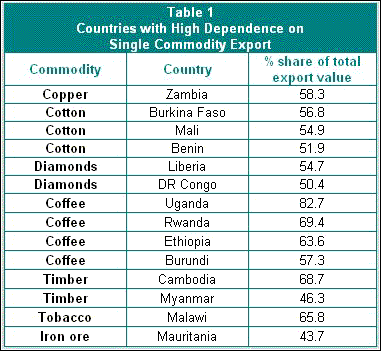
The worst affected economies tend to be those in Sub-Saharan Africa, often seen as the "forgotten continent" because the major powers no longer really bother with the implications of their decisions on the conditions of the people in that region. This is a region where per capita incomes have been falling for more than three decades now, but the complete apathy which greets such disclosures in WTO meetings, for example, is testimony to the powerlessness of these countries despite their huge natural resources and large populations as a group.
The past few years have been especially hard, as terms of trade have moved against the African countries quite significantly. Chart 3 shows the extent of movement of terms of trade in 1997 and 1998, and Chart 4 provides an estimate of the impact of this in terms of the GNP of these countries. It should be noted that these recent changes occurred in a context of a secular trend decline in terms of trade for Africa for more than a decade.
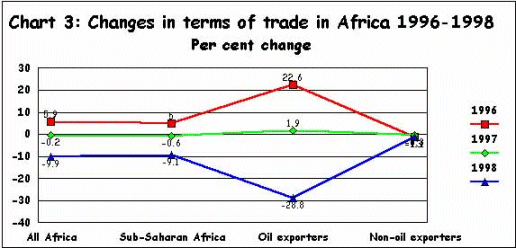
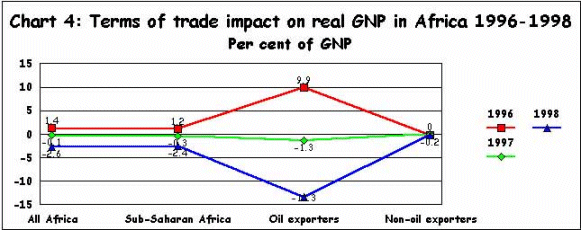
All this also helps to explain why the share of all LDCs in world and developing country output and exports has not only not increased but even worsened in the 1990s, compared to the second half of the 1980s. Charts 5 and 6 provide some estimates of this. Chart 6 also indicates that LDC access to net financial inflows and even official development assistance has worsened in terms of share of developing countries.
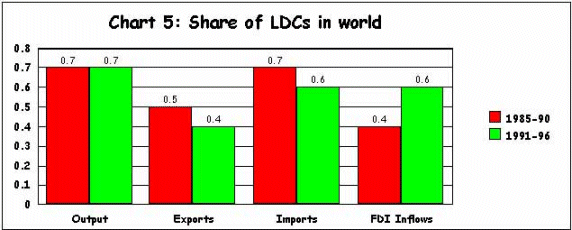
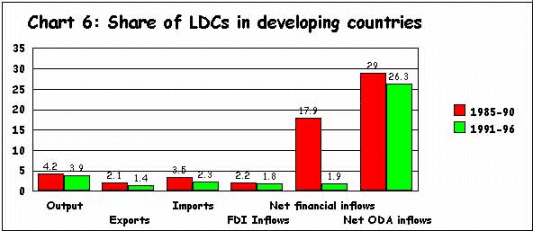
The Uruguay Round was supposed to increase dramatically the ability of developing countries in general to export agricultural products, as well as to increase world prices of such goods because of reduced Northern subsidies. It is now well known that the fine print in the Agreement on Agriculture has made it possible for the developed countries to continue with very high rates of subsidisation for agriculture. But even the import protection of their agricultural markets continues to be very high. Chart 7 shows that the incidence of high tariff peaks (that is, in excess of 12 per cent) is much greater for agricultural products than for manufactured goods for all three major developed country trade groups.
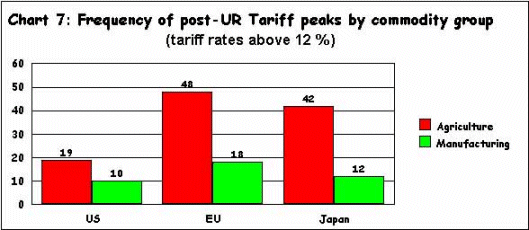
In fact, it is now accepted that the supposed decade of dynamic globalisation has not really offered all that much in terms of greater market access or even ability to import, for the whole group of all developing countries. As is clear from Charts 8 and 9, rates of growth of export and import for all developing countries as a group in the 1990s, even before the "Asian crisis" years of 1997 and 1998 when world trade actually fell in value terms, were well below the period of the 1970s which were supposedly characterised by closed economies, stagflation and relatively high degrees of protectionism.
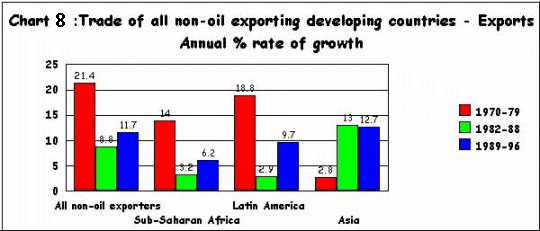
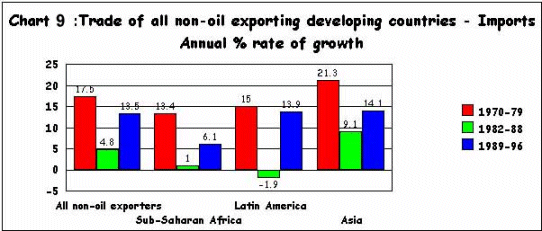
If, despite all this, many Least Developed Countries are still anxious to gain entry into the WTO, it is because the fragility of their economic conditions makes them long for some degree of multilateralism and basic ground rules. With all its warts and secretive processes, the WTO is still a better option for most such countries than overt bilateral control by a particular major power, which is the state many of them otherwise find themselves in.
Since most of them are also highly indebted countries, they are typically also firmly within the coils of IMF conditionalities which effectively determine all their major economic and trade policies. Thus, many of them have been unable to take advantage of special provisions made for them in GATT, because the IMF, the World Bank or other creditors simply impose more liberalisation and government withdrawal on them anyway.
In such a depressing context, the only hope for LDCs and for smaller developing countries generally, is much greater unity and an emphasis on concerted positions in international forums to press for their common interests. If the Seattle episode makes for that realisation and helps to provide more unity among these countries, then those four days may turn out to have been very fruitful after all.
© MACROSCAN 1999